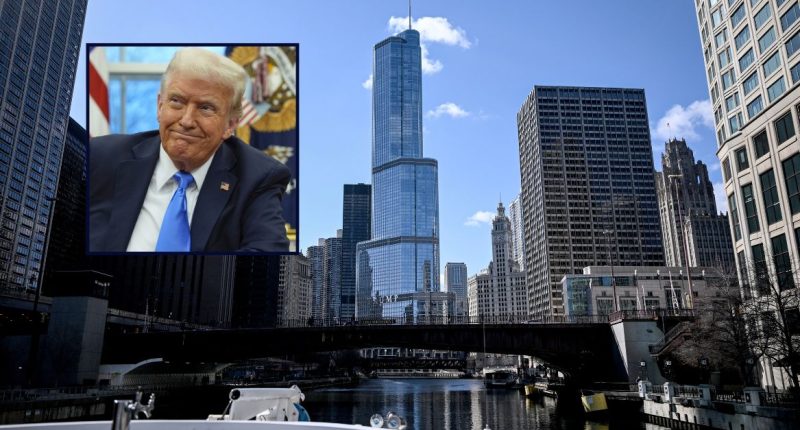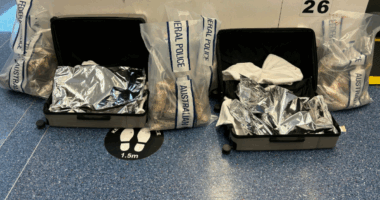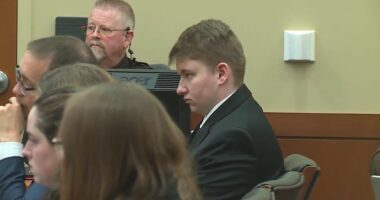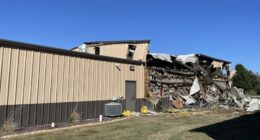Share this @internewscast.com
Inset: President Donald Trump addresses reporters in the Oval Office at the White House on Tuesday, Feb. 11, 2025, in Washington, D.C. (Photo/Alex Brandon). Background: 09 March 2024, USA, Chicago: The Trump Tower in Chicago rises into the blue sky (Britta Pedersen/picture-alliance/dpa/AP Images).
President Donald Trump’s eponymous family company will pay millions to resolve long-standing civil lawsuits brought by authorities and activists in Illinois concerning repeated breaches of clean water laws.
On Thursday, the management of Trump International Hotel & Tower, one of several large skyscrapers along the Chicago River, agreed to a $4.8 million settlement addressing multiple breaches of state environmental laws and regulations, as announced by Illinois Attorney General Kwame Raoul in a press release.
The disputes in the case centered around the cooling water intake system (CWIS) used by the 100-story building. Lawsuits filed by a Raoul, Friends of the Chicago River, and the Sierra Club allege the system killed vast numbers of fish and other aquatic life by pulling in over 20 gallons of river water per day in order to cool down the building’s heating, ventilation and air conditioning systems.
“The Chicago River is one of our city’s most treasured natural resources, and future generations should benefit from the opportunities for recreation and commerce it provides,” Raoul said in a statement. “I am pleased to have reached this agreement, which will protect the Chicago River and the important habitat that it provides to local wildlife. I am committed to continuing to vigorously enforce our environmental laws.”
Love true crime? Sign up for our newsletter, The Law&Crime Docket, to get the latest real-life crime stories delivered right to your inbox.
The agreement comes roughly eight months after a judge found the company that runs the tower, 401 North Wabash Venture LLC, fully liable for a continued public nuisance over how the CWIS operates.
“Defendant has created and continues to create a public nuisance in violation of Illinois law by operating its CWIS in a manner that substantially and unreasonably interferes with the public right to fish and otherwise recreate in the Chicago River,” Cook County Circuit Court Judge Thaddeus L. Wilson wrote in September 2024.
The litigation dates back to 2018, after a routine regulatory review determined an earlier permit issued in 2013 had expired in 2017 and not been renewed. Under the terms of that earlier permit issued by the Illinois Environmental Protection Agency, the company was required to perform a study about the number of animals killed by the CWIS — but did not do so within the required time frame.
In turn, Raoul entered into an interim agreement with the Trump Organization to abide by those earlier terms of the permit. Later, authorities upped the ante and filed an amended lawsuit after discovering Trump Tower had been underreporting the volume of heated water it was dumping back into the river for over a decade.
Now, under the proposed terms of the settlement, $3 million will go toward a project aimed at restoring the habitats for fish and other aquatic life in the Chicago River. Another $1.5 million will go directly to the state as a civil penalty; the remaining $300,000 will cover litigation expenses.
“The proposed settlement represents years of work by the Illinois Attorney General’s Office and Illinois EPA’s legal and technical staff to hold 401 North Wabash Venture LLC responsible for its failure to follow Illinois environmental laws,” Illinois EPA Acting Director James Jennings said. “Trump Tower showed a disregard for the environment through its daily discharge operations, which violated the Illinois Environmental Protection Act and Illinois Pollution Control Regulations. It is only appropriate that this settlement directly benefit the Chicago River and the local habitats of its aquatic life.”
The settlement, however, is not set in stone and requires a judge’s approval — which will come, at the earliest, later this summer.
First, the proposed settlement is subject to a 30-day public comment period, then the court will have an opportunity to weigh in.















